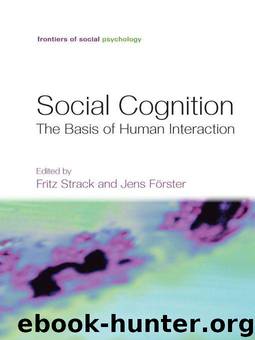Social Cognition: The Basis of Human Interaction (Frontiers of Social Psychology) by Unknown

Author:Unknown
Language: eng
Format: mobi
ISBN: 9781136874161
Publisher: Taylor and Francis
Published: 2011-06-22T16:00:00+00:00
METACOGNITIVE NAÏVE THEORIES AND THE RELIANCE ON FEELINGS
We discussed how individuals can shield themselves against the unwanted impact of activated declarative knowledge on the basis of their metacognitive naïve theories. Declarative knowledge, however, is not the only information that enters into human judgment and decision making. The processing of declarative knowledge is in many cases accompanied by subjective experiences (Bless & Forgas, 2000; Clore, 1992; Schwarz, 1998; Schwarz & Clore, 1996). These subjective experiences include affective feelings and cognitive feelings and can themselves serve as a basis for social judgments. Thus, they can exert an impact that is, at least partly, independent of the declarative knowledge. Often, such a reliance on subjective experiences is highly justified, for example, when individuals use their current mood to evaluate the likeability of a person they have been talking to for an hour. In this case, the feeling state presumably results from the interaction with the target person and reflects as a sort of summary of the perceiver’s thoughts and evaluations (“I feel good because of this person”) and can thus provide a solid basis for judgment—in other words, the feeling is representative for the judgmental target.
Similar to declarative knowledge being considered relevant by default, feeling states are often attributed by default to the current situation and to the current judgmental object and are thus seen as relevant for the judgment. However, the link between the experienced feeling and its origin is often unclear. Feelings are often diffuse, work in the background, and are frequently not the focus of an individual’s attention. As a consequence, feelings may sometimes not be attributed to their correct source. Under such conditions, however, relying on the feeling could result in an unwanted influence on the individuals’ judgments. For example, a target person may be evaluated rather negatively simply because the judge was in a negative mood due to some unrelated event prior to encountering the target person. Given the robust impact of feelings on human judgment and decision making and given the diffuse nature of feelings and their often-unclear origin, individuals would be well advised to shield themselves against unwanted influences from their feelings. We argue that in this respect, individuals—similar to the unwanted influence of declarative knowledge—rely on their metacognitive naïve theories. In the next section, we address this issue, in turn, for affective and cognitive feelings.
Affective Feelings
Schwarz and Clore (1983) proposed that individuals use their current affective state as a source of information for their judgments. Instead of relying on an elaboration of declarative knowledge about the relevant judgmental object, individuals may ask themselves, “How do I feel about it?” and use this feeling as the basis of their judgment (see Schwarz & Clore, 1996). In a now-classic experiment, Schwarz and Clore (1983) interviewed participants on the telephone on either a sunny or a rainy day and assessed participants’ current mood and their life satisfaction. Not surprisingly, participants were happier on a sunny day. More important, they reported more satisfaction with their life in general on a sunny day.
Download
This site does not store any files on its server. We only index and link to content provided by other sites. Please contact the content providers to delete copyright contents if any and email us, we'll remove relevant links or contents immediately.
What's Done in Darkness by Kayla Perrin(26601)
The Fifty Shades Trilogy & Grey by E L James(19084)
Shot Through the Heart: DI Grace Fisher 2 by Isabelle Grey(19067)
Shot Through the Heart by Mercy Celeste(18940)
Wolf & Parchment: New Theory Spice & Wolf, Vol. 10 by Isuna Hasekura and Jyuu Ayakura(17123)
Python GUI Applications using PyQt5 : The hands-on guide to build apps with Python by Verdugo Leire(17001)
Peren F. Statistics for Business and Economics...Essential Formulas 3ed 2025 by Unknown(16883)
Wolf & Parchment: New Theory Spice & Wolf, Vol. 03 by Isuna Hasekura and Jyuu Ayakura & Jyuu Ayakura(16831)
Wolf & Parchment: New Theory Spice & Wolf, Vol. 01 by Isuna Hasekura and Jyuu Ayakura & Jyuu Ayakura(16455)
The Subtle Art of Not Giving a F*ck by Mark Manson(14357)
The 3rd Cycle of the Betrayed Series Collection: Extremely Controversial Historical Thrillers (Betrayed Series Boxed set) by McCray Carolyn(14145)
Stepbrother Stories 2 - 21 Taboo Story Collection (Brother Sister Stepbrother Stepsister Taboo Pseudo Incest Family Virgin Creampie Pregnant Forced Pregnancy Breeding) by Roxi Harding(13653)
Scorched Earth by Nick Kyme(12775)
Drei Generationen auf dem Jakobsweg by Stein Pia(10968)
Suna by Ziefle Pia(10892)
Scythe by Neal Shusterman(10342)
The Ultimate Python Exercise Book: 700 Practical Exercises for Beginners with Quiz Questions by Copy(9683)
D:\Jan\FTP\HOL\Work\Alien Breed - Tower Assault CD32 Alien Breed II - The Horror Continues Manual 1.jpg by PDFCreator(9675)
De Souza H. Master the Age of Artificial Intelligences. The Basic Guide...2024 by Unknown(9617)
